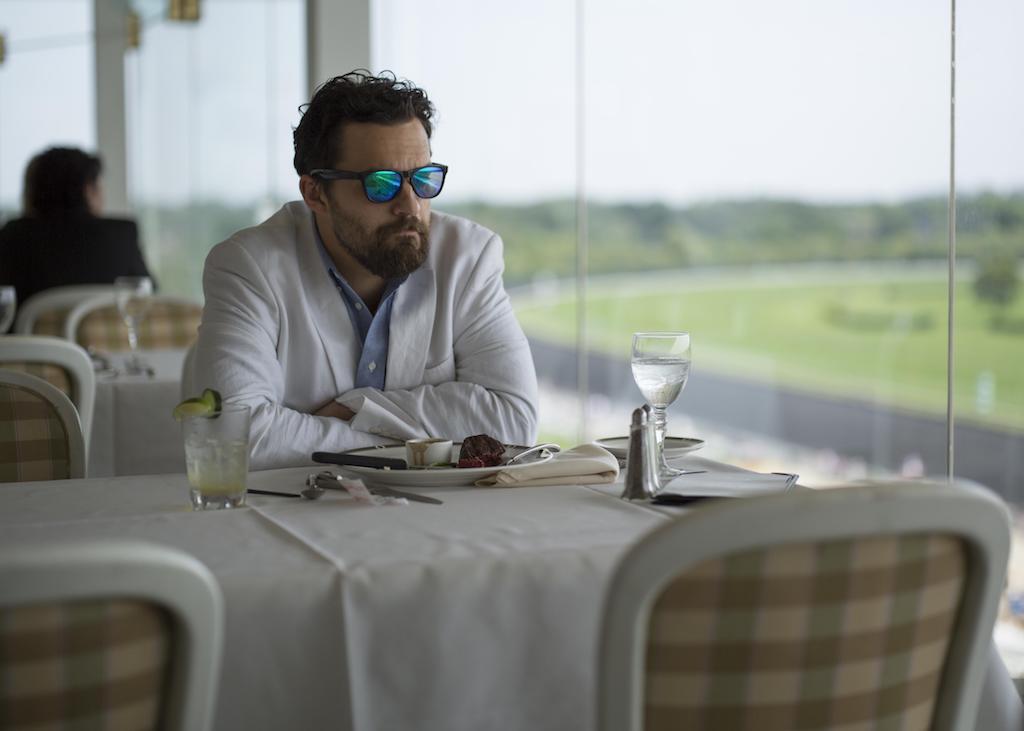After a decade of hustling on shoestring budgets, Joe Swanberg is changing his tune. No longer content with making small films for an even smaller audience, the Midwestern auteur is looking for something different these days. At thirty-five, married and with two kids, he resides in Chicago, often demanding that projects come to him (see: last year’s excellent Netflix miniseries, Easy).
“There were years in the past where I was making a lot of work in a very short amount of time,” he said in our conversation. “I’m just not that interested in that anymore.” Interests inevitably change, as has Swanberg’s subject material. His latest film Win It All focuses on degenerate gambler Eddie Garrett (played by frequent collaborator Jake Johnson), who agrees to protect a duffel bag for an acquaintance heading to prison. Should Eddie leave the bag unopened and in his possession, he’ll be properly compensated for his work. It is a great deal—but also a safe bet. As you can predict, Win It All is not about an addict who spends ninety minutes healthily resisting temptation. Eddie opens the bag.
Swanberg spoke with me shortly after the film’s smash premiere at SXSW. He discussed operating within the confines of Netflix, reaching a larger audience, and why, after fifteen years of constant moviemaking, he’s excited about maybe, well, not working.
How are you feeling about now?
Really good. We had an amazing SXSW screening and coming off of the Easy release, I’m super excited fo the movie to go to Netflix. I just felt that so many more people saw Easy than the previous films, so I’m really excited to get Win It All in front of that size of the audience.
Was that the thinking behind moving to Netflix visibility?
Definitely. After thirteen years of filmmaking and putting out a lot of different movies in a lot of different ways, it’s a global, same-day release that I don’t think anybody else comes anywhere close to in terms of the size of the audience that can access the work. I personally watch a lot of Netflix, so I know that it works, but also the experience of putting Easy out was a confirmation that not only did a lot more people see the work but a lot wider of a type of audience in terms of ages and places people live. My movies typically come out, if they get a theatrical [release], in twenty to forty major cities, and the Netflix release really made my stuff accessible to a lot of people around the world.
When your films, from Hannah, Takes the Stairs to Drinking Buddies, opened in those cities, they definitely created a loyal fanbase. Do you think Netflix will do something similar? Like, ‘Oh my God, the new Joe Swanberg movie on Netflix!’
I don’t know, but what I’ll tell you is I’m very excited to be at a place where people would be accessing the work who have no idea who I am and aren’t even the kind of viewers who pay attention to who the director is, you know? After a very long time of living within what felt like this really vibrant and interesting cinephile world, with film festivals and theatrical releases and the kind of audiences that the IFC Center or the Music Box in Chicago cultivates, there’s something very nice about moving outside of that and sort of working in a way where the work has to stand up to a broader audience who is going to approach it like it’s the new Netflix show or movie, not the new Joe Swanberg movie. I’m sort of ready to be at that place. I’m having a very good time checking the responses to the work when it’s not a person who has seen anything else I’ve made. They’re just sitting down to watch a TV show or a movie.
Has that Netflix model, in turn, informed or changed the way you’re approaching these projects on set?
No, not at all. I do feel incredibly supported by them, and the people I’m working with there are fans of my movies. They’ve created an environment where essentially I’m able to continue doing the things that are unique to my process and working with the people with who I love working. Then they’re just being released through a platform that’s granting them a much bigger audience. It feels like a very ideal situation right now where there’s been no pressure from them or from me to change how I work or what I want to make. On the movie front, it’s more of a case-by-case basis, but with the series Easy that I do, they’re very much willing to sort of taking a chance on me based on the past work. Beyond the desire to want to reward their riskiness in believing in me by making something good, I’m still interested in making something that’s good by my standards of good. The same goes for the movies. I’m choosing projects for the same reason I’ve always chosen them. I’m working with people for the same reason I’ve always wanted to work with them. The key difference is that the audience is just getting bigger.

Would you characterize the protagonist, Eddie, as a gambling addict?
Definitely—I think he has a problem. It’s interesting because in thinking about Eddie Garrett, that lead character, I really relate and connect. While I wouldn’t say that I have a gambling problem, in terms of the way that I have managed my career and put my own money into my career, I definitely feel like a gambler. I know the feeling of taking a big, crazy chance on something just because you have a gut instinct about it. In terms of that character, he’s definitely at a place where he can’t help himself and is not making any kind of rational decisions. He’s making the kind of decisions an addict makes.
Do you take those risks because you trust your gut?
Yeah, in terms of my work, it’s a combination of trusting my gut and understanding the indie marketplace as much as anybody can. Sometimes I’m right and sometimes I’m wrong. The difference is I’m never gambling more money than I can afford to lose, and Eddie is always gambling more money than he can afford to lose. I’m taking as safe a bet as I possibly can take, but it’s always a risk. There’s no guarantee in independent film, you just sort of take a chance and hope it works out.
When we see him gambling, there’s not a lot of focus on the actual card-playing. Was that an intentional choice?
Jake and I talked a lot about that as we were working on the movie because I am not a card player, so I sort of told him that I was going to function as the checks and balances system because I didn’t want to make a movie just for card players. Jake really knows how to play cards; we could’ve done those sequences in a very technical way. I just wasn’t interested in that as an audience, so in the shooting and the editing process, I always wanted to feel the sequences move in a way where you didn’t have to know anything about cards to understand what was going on. I think that I de-emphasized the focus on card-playing in an effort to keep the gambling sequences emotional more than technical.
They’re definitely emotional. Is it a tough walk in making a comedy about addiction?
Comedies are hard to make, period. They’re very scary to me, which is why I would say that I’ve made a few comedies and mostly dramas. For me, comedy is just a more exciting avenue to take when you’re dealing with tragic material, because a tragic approach feels heavy and often off-putting in terms of spending the amount of time you spend making a movie. As I get older and approach projects knowing what the sacrifices are in terms of not seeing my family a lot when I’m working on a movie, the emotional and time commitment that it takes, something has changed about the way I think about what I want to be spending that time on. I would say I’m leaning almost entirely towards comedy these days because no matter what the subject matter is, I feel like comedy opens up the ability to talk about anything. For me as an audience member, even if I’ve heard a movie is really good, if I’m reading a description that sounds like a really bleak, dour movie about gambling addiction and the horrible trauma and consequences of it, I’m not sure that I’m going to choose to engage with that movie, or I have to be in a really particular mood to choose that. With a comedy, I feel that we have the opportunity to reach people in a way where their guard might be down a little bit more, and then some of that stuff might sink in a different way.
As your career has gone along, has that time commitment gotten harder to manage?
It’s hard to say whether the pace that I’m working at now is a result of that or just a natural evolution and also just a natural aging process. There were years in the past where I was making a lot of work in a very short amount of time, and I’m just not that interested in that anymore. I’m gravitating more towards focusing more on projects and spending a long time developing stuff. For the first time in my life, over the last two years maybe, I’m interested in not working. I used to just spend as much time as possible each year making as much work as I could possibly make. I’m very much appreciating the downtime in between projects now as opportunities to recharge my batteries and also just to take stock of what’s going on, what I’m interested in, giving myself time to be reading and watching other people’s work. Even just going for walks—stuff that I was never prioritizing earlier now feels like a really healthy and balanced part of a sustained career as an artist. I’ll probably go through waves of rapid production again. I’m sure that’s still kicking around in me as part of my personality, but I’m sort of forcing myself to think about life in a bigger, more complex way, and to make life not be so totally about work, but also be about experiencing things.




